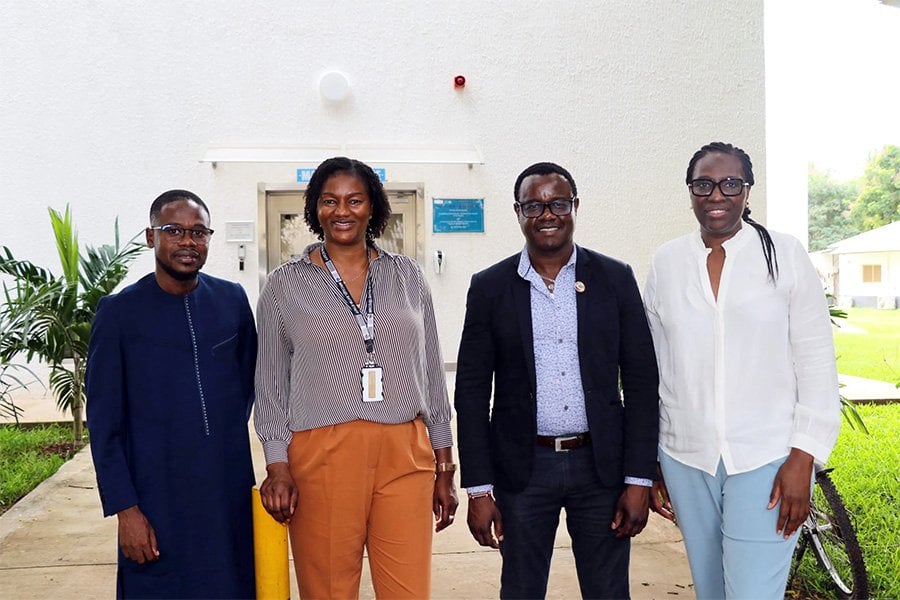
Photo credit: MRCG at LSHTM/Mamud Joof
The workshop, held from 4-7 October 2022 and the training held from 10-12 October 2022 at Ocean Bay Hotel, Bakau, was aimed at identifying the ethical review capacity gaps of existing Research Ethics Committees (REC) in institutions conducting health related research. Working together with the participating stakeholders, solutions will be developed which will allow these institutions to have fully functional RECs with the right competencies, knowledge, skills, and systems required to conduct high quality ethical review of research proposed to be conducted in the Gambia.
The ERC project, coordinated by MRCG at LSHTM and funded by the European and Developing Countries Clinical Trials Partnership (EDCTP), aims to build a robust ethics and regulatory governing framework to enhance the ethics and regulatory capacity of The Gambia, establish institutional research ethics committees, and ensure optimal protection for research participants.
In his opening remarks, Dr Davis Nwakanma, Chief Operations Officer of the MRC at LSHTM said: “Since 1978, ethical review through The Gambia Government/MRCG at LSHTM joint ethics committee has been ongoing. Health research is important to our survival as humans and with many institutions now engaging in research, a regulatory framework is needed. Ethics review goes beyond clinical trials to other areas of research involving humans. It is important to respect the safety, dignity of individuals but also to conduct scientific review to ensure that the research we conduct is scientifically sound.”
He added: “In the future, we hope the landscape will transform and stakeholders such as researchers and regulators will be better equipped to conduct research that is acceptable. This will lead to improvement in the lives of people.”
In his statement, James Gomez the Director of Research at the Ministry of Higher Education, Research, Science and Technology (MoHERST), said: “Research should lead to development. We want to see start-up companies emanating from research. It is our hope that Universities help Gambians convert the potentials of young people to the creation of new jobs, especially start-ups that can compete with the sub-region and globally. Thus, tertiary and higher education institutions should be innovative and ensure research outputs go beyond the classrooms or laboratories.”
Elizabeth Batchilly is the Head of Research Support and Governance Services at the MRC at LSHTM and Principal Investigator PI of the ERC Study. She gave an overview of the ERC project She mentioned that there is an urgent need to build the ethical review capacity of the country, especially in health research. MoHERST has done an excellent job in setting the scene and the validation of the National Research Policy has created a solid foundation for the next steps to be taken. She called on the experts at the workshop to support MoHERST as they work towards the development of the framework and other important guidelines which will enable the harmonisation of ethical review across all institutions conducting research.
Speaking on behalf of the Minister of Health, Markieu Janneh Kaira, Executive Director, the Medicines Control Agency (MCA) underlined the significance of creating systems that regulate research in the country.
She said: “Research is not new in The Gambia. It has been ongoing through the MRCG at LSHTM regarding clinical trials or other health studies for over 50 years. However, systems to regulate research in The Gambia have been underdeveloped and non-existent at some point. For the past decade, the regulatory capacity in terms of clinical trials has been strengthened through the establishment of the MCA.
“We have the legal requirement to regulate clinical trials. This workshop is very timely and with the help of MoHERST mandated to conduct research, we can work together to create a framework for all stakeholders and research institutions to build their capacity.”
The Ethics Review Capacity (ERC) project began on the 1st of July 2021 and will end on June 30th, 2023. As part of the outcome, the consultative workshop developed a National Ethics and Research Regulatory Framework that will be used as a benchmark for the conduct of research in The Gambia.
If you enjoyed this article and would like to build a career in global health, we offer a range of MSc programmes covering health and data, infectious and tropical diseases, population health, and public health and policy.
Available on campus or online, including flexible study that works around your work and home life, be part of a global community at the UK's no.1 public health university.
